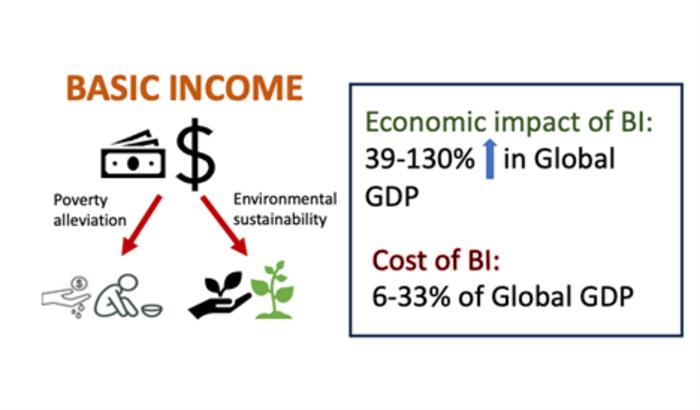Giving a regular cash payment to the entire world population has the potential to increase global gross domestic product (GDP) by 130%, according to a new analysis published June 7 in the journal Cell Reports Sustainability. Researchers suggest that charging carbon emitters with an emission tax could help fund such basic income program while reducing environmental degradation.

Credit: Louise The/University of British Columbia
Giving a regular cash payment to the entire world population has the potential to increase global gross domestic product (GDP) by 130%, according to a new analysis published June 7 in the journal Cell Reports Sustainability. Researchers suggest that charging carbon emitters with an emission tax could help fund such basic income program while reducing environmental degradation.
“We are proposing that if we can couple basic income with environmental protection, we can save two birds with one stone,” says first author U. Rashid Sumaila of the University of British Columbia in Vancouver.
Sumaila has been working on ending harmful fishery subsidies worldwide, but many people who rely on fisheries for their livelihoods, especially those in developing countries, say they need the subsidies to support their families. “One of the ways we can deal with this is to give the people basic income. With that, we could achieve sustainability goals without compromising people’s livelihoods,” he says.
The research team estimated that it would cost $41 trillion to provide the entire world population of 7.7 billion people with a basic income, or $442 billion to fund only 9.9 million people living below the poverty line in less developed countries. In return, giving basic income to the entire world population could boost the global GDP by $163 trillion, which is about 130% of the current GDP.
Every dollar spent on implementing basic income can generate as much as $7 in economic impacts, the analysis shows. “If you give someone one dollar, they will spend part of the money to buy food or pay rent. And people that are paid for the food and accommodation will use part of this for their own consumption and so on. The dollar will trickle up throughout society. Our calculations show that the economic impact of that dollar will be much greater than its original amount,” Sumaila says.
The team also explored ways to fund basic income. They estimated that taxing CO2 emitters alone can generate about $2.3 trillion a year, enough to provide a basic income for all people living below the poverty line in less developed countries.
The researchers also suggested other alternative options to finance basic income programs, such as a plastic pollution tax or redirecting harmful oil, gas, agriculture, and fisheries subsidies to fund the program. These approaches can address two of the biggest challenges around the world—reducing environmental degradation and alleviating poverty.
Real world examples have shown the benefits of basic income programs. For example, in Indonesia, villages that received a basic income have substantially lower deforestation rates than those without it.
“It’s not easy to implement carbon taxes, but that doesn’t stop our academics from reporting the evidence we have. Besides, we are not taxing everyone, just those who pollute the environment. They should pay for the damage they caused,” Sumaila says.
Basic income can also be a proactive program, Sumaila says. When crises like pandemics or natural disasters hit, communities can be more resilient.
“We saw during COVID-19, governments around the world were coming up with all sorts of programs to support people who suddenly lost their ability to earn income. If we had basic income in place, we didn’t have to scramble,” Sumaila says.
###
This work was supported by the Social Sciences and Research Council of Canada and the Chair Research Chair programme.
Cell Reports Sustainability, Sumaila et al. “Utilizing basic income to create a sustainable, poverty-free tomorrow”
Cell Reports Sustainability (@CellRepSustain), published by Cell Press, is a monthly gold open access journal that publishes high-quality research and discussion that contribute to understanding and responding to environmental, social-ecological, technological, and energy- and health-related challenges. Visit https://www.cell.com/cell-reports-sustainability/home. To receive Cell Press media alerts, contact press@cell.com.
Journal
Cell Reports Sustainability
Method of Research
Computational simulation/modeling
Subject of Research
Not applicable
Article Title
Utilizing basic income to create a sustainable poverty-free tomorrow
Article Publication Date
7-Jun-2024



